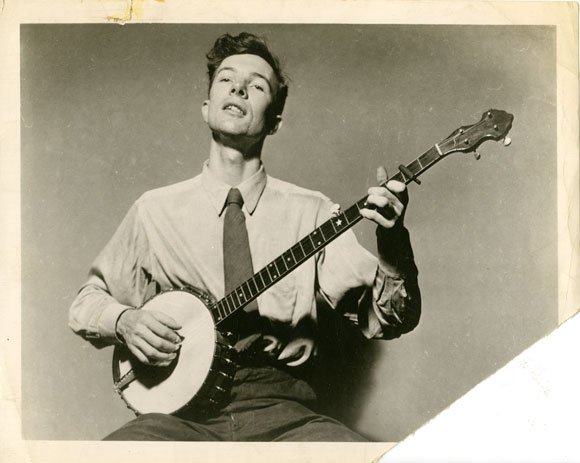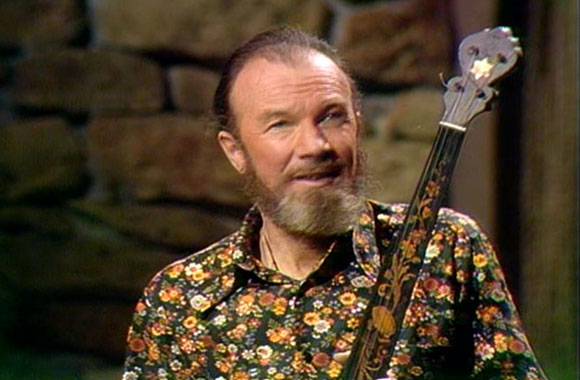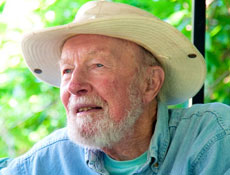"To everything there is a season," according to Pete Seeger's song "Turn, Turn, Turn," using words from the Book of Ecclesiastes, "a time to be born and a time to die." This remarkable New York City singer/songwriter died on January 27, 2014, at the grand old age of 94. Seeger was committed to turning the world around with songs about peace, social justice, the environment, and the lifting up of those mired in poverty and powerlessness.
"Being generous of spirit is a
wonderful way to live."— Pete Seeger

Born on May 3, 1919, Seeger was the son of an ethnomusicologist and part of a family that excelled in playing instruments of all types. Planning to be a journalist, he attended Harvard but dropped out and landed a job cataloging music at the Archive of American Folksong. He wrote the book on banjo playing and became a cheerleader for musical groups of all kinds.
"Once upon a time,
wasn’t singing a part of everyday life
as much as talking,
physical exercise, and religion?
Our distant ancestors,
wherever they were in this world,
sang while pounding grain,
paddling canoes, or walking long journeys.
Can we begin to make our lives
once more all of a piece?
Finding the right songs and singing
them over and over is a way to start.
And when one person taps out a beat,
while another leads into the melody,
or when three people discover a harmony
they never knew existed,
or a crowd joins in on a chorus
as though to raise the ceiling
a few feet higher,
then they also know
there is hope for the world."— Pete Seeger
As a member of the Almanac Singers, Seeger proclaimed the rights of workers. Doing a stint with the Weavers, he popularized Leadbelly's "Goodnight Irene." His adaptation of the gospel hymn "We Shall Overcome" became the central anthem of the African-American Civil Rights Movement. Seeger helped shine a spotlight on his friend Woody Guthrie's "This Land Is Your Land" and to this day many believe it should be America's national anthem.
"A good song reminds us of
what we are fighting for."— Pete Seeger

This singer/ songwriter's activism worked its way into many of his most memorable folk songs including the antiwar ballads "Where Have All the Flowers Gone?" and "If I Had a Hammer." Seeger expanded the embrace of this musical genre to songs from other cultures such as "Wimoweh (The Lion Sleeps Tonight)" and "Guantanamera."
"One of the things I'm most proud of
about my country is the fact
that we did lick McCarthyism
back in the fifties."— Pete Seeger
During the terrible prejudices and persecutions of the fifties, the singer/songwriter was blacklisted for his left-wing views and many radio networks banned his songs. But Moe Asch issued scores of Seeger's albums on Folkways Records. He played for many summer camps and recorded albums for children. Years later, he served as a catalyst for the folk music revival by performers such as Peter, Paul, and Mary; Bob Dylan; the Kingston Trio; Joan Baez; and Phil Ochs.
In 1966, Seeger launched the nonprofit Clearwater Project, aimed at cleaning up the polluted Hudson River. Once again, he led the way for others to dedicate themselves to the cause of environmental stewardship. Pete Seeger received many honors and awards during his lifetime but perhaps the times that meant the most to him were when audiences joined him in singing his songs. Here's what he said about those magic moments:
"In each of my concerts there are some old songs which you and I have sung together many times before, but which can always stand another singing. Like another sunrise, or another kiss, this also is an act of reaffirmation."
"Our songs are, like you and me, the product of a long, long human chain, and even the strangest ones are distantly related to each other, as we all are. Each of us can be proud to be a link in this chain. Let's hope there are many more links to come.
"No: let's make damn sure there are more links to come."
You can link to the spirit of Pete Seeger which lives on in videos of his performances and CDs of his musical legacy. Enjoy a selection of his music here.
